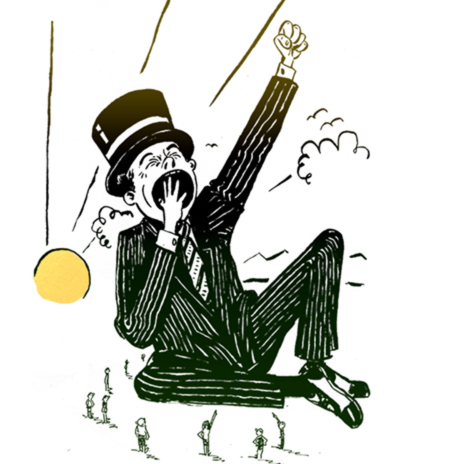ZEITGUIDE TO UNDERSTANDING NET NEUTRALITY

“BUSINESS” IMAGE BY KRIS PORTER
“Net neutrality” was back in the headlines this week, when FCC chairman Tom Wheeler unveiled his latest thinking on how to regulate broadband Internet services in a Wired op-ed.
If your eyes just glazed over, we hardly blame you. Few people get the slow grind of this argument. But it’s about to come to a head with an FCC vote on Feb. 26.
Let’s distill what’s been going on to catch you up.
So what’s this debate about?
Basically, it’s whether broadband Internet service should be considered (and thus regulated) like telephone service, or whether it should be more like a tiered-price cable TV package where what you watch affects the price.
Right now, we expect our Internet to be like the telephone: that is, that you pay for service and call who you want. The phone company doesn’t determine whom you call, restrict how long you stay on the line, or limit when you make those calls.
Likewise, this thinking goes, when you surf the Internet, your Internet company (Verizon, Comcast, Time-Warner Cable, AT&T, etc.) shouldn’t change its fees based on whether you are writing a blog post or watching Super Bowl highlights on YouTube. (Sorry, Seattle). No blocking, no throttling, no “fast lanes.” The network should be neutral about what megabits are flowing through it.
Last April, the FCC (the panel that regulates all interstate communications) looked poised to change all that. After losing an Appeals Court ruling last year, the FCC appeared to shrug and say, “Fine. Go ahead and sell high-speed priority bandwidth to Netflix, YouTube, or whomever. The rest of you can just wait.” Additional fees might also have applied on the consumer’s end as well. Then everything really hit the fan.
Why did the FCC ever suggest such a thing?
Streaming video takes up a whole lotta bandwidth. In fact, YouTube and Netflix combined take up almost 50% of it in North America. That’s like two companies filling up half of every UPS truck sent out on deliveries.
Internet providers wanted to charge these content companies—or cut deals with them—for using up so much bandwidth. Verizon sued in 2011 when the FCC tried to stop that from happening. But Verizon won. And that’s when FCC looked like it was about to cry uncle.
Almost no one liked this. Not free-speechers. Not Silicon Valley. Certainly not most media companies. And not President Obama.
Some 4 million Americans submitted comments to the FCC on the proposed changes. Comedian John Oliver called the “tiered Internet” idea essentially the same as Jamaican track star Usain Bolt running against “Usain Bolt bolted to an anchor.”
After all that, the FCC now has a new tactic: it is going to lump broadband in with other “telecommunications” services, which are subject to much more stringent regulations. (Right now they’re in the looser “information services” category.) And that is what the FCC will vote on at its meeting Feb. 26.
So, you might be asking: after all this, is my Internet access going to even change at all?
Yes and no. An OK of Tom Wheeler’s proposal would give the FCC broad power to set rules about broadband services, but most individuals’ access the Internet will not be impacted if it’s approved.
However, the same might not be true of your Internet bill.
The Progressive Policy Institute has estimated that state and local taxes and fees could go up $67-$72 per year, plus another $17 for federal fees. Such Internet taxes might, however, be prohibited under to the Internet Tax Freedom Act which prevents local governments and states from creating new taxes to surf the web.
So will this finally be over? Can we all go back to speculating about “House of Cards” Season 3?
Not quite. The big Internet service providers seem certain to sue the FCC again.
AT&T, which was itself sued last year for throttling “unlimited” mobile data, has already previewed its lawsuit plans. However, the FCC looks forward to this fight. Gigi Sohn, the FCC chairman’s special counsel for external affairs, told TechCrunch that the FCC would in a good position, stating, “We will win the inevitable legal challenge.”
There’s always Capitol Hill, too. The Republican Congress could reign in the FCC. But the president seems likely veto any such move.
Okay, now that you’re “net neutrality” geniuses, back to “House of Cards,” everyone.
